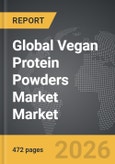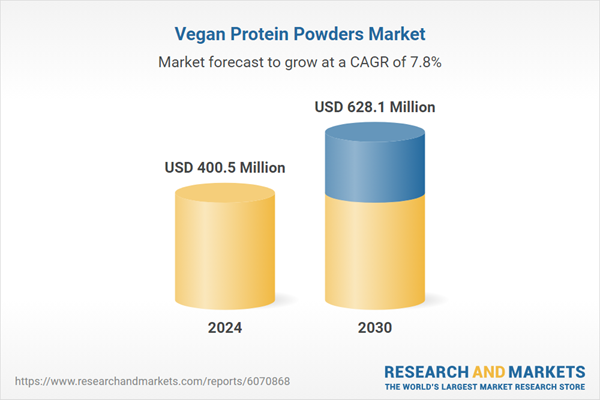Global Vegan Protein Powders Market - Key Trends & Drivers Summarized
Why Is Vegan Protein Powder Emerging as the New Standard in Performance and Everyday Nutrition?
Vegan protein powder has rapidly transitioned from a niche supplement to a mainstream staple, driven by a broad convergence of health, ethical, and sustainability trends. As more consumers embrace plant-based or flexitarian lifestyles, vegan protein powder is gaining popularity among athletes, fitness enthusiasts, and health-conscious individuals who seek clean, dairy-free, and allergen-friendly alternatives to traditional whey or casein protein. Unlike animal-derived products, vegan protein powders are often made from sources such as pea, brown rice, hemp, pumpkin seed, sunflower, and chia - ingredients that not only provide essential amino acids but also align with the rising demand for minimally processed, sustainable foods. With an increasing number of consumers prioritizing gut health, anti-inflammatory diets, and lactose-free nutrition, vegan protein powder offers a functional, digestible, and inclusive solution. This demand is further boosted by consumers' growing awareness of the environmental toll of animal agriculture, leading to widespread interest in plant-based protein sources with lower carbon footprints. Vegan protein powders are also appealing for their versatility, used not just in post-workout shakes but in smoothies, baking, meal replacements, and snack bars - making them a dynamic part of modern nutrition habits.How Are Ingredient Innovations and Functional Blends Redefining Product Performance?
Innovation in ingredient sourcing and processing is playing a critical role in the enhanced performance and palatability of vegan protein powders, helping the category compete directly with traditional protein supplements. One of the biggest breakthroughs has been the development of multisource protein blends - such as pea and rice or hemp and pumpkin seed - that achieve complete amino acid profiles for muscle repair and recovery. These formulations are increasingly tailored for specific needs such as muscle building, weight management, endurance, or satiety. The use of natural flavors, enzyme-treated proteins, and advanced filtration methods has significantly improved taste and texture, addressing one of the major consumer pain points with earlier vegan protein options. Functional fortification is also on the rise, with many products now infused with probiotics, digestive enzymes, fiber, adaptogens, and vitamins to deliver holistic wellness benefits. Innovations in sprouting, fermentation, and cold-processing techniques are enhancing nutrient bioavailability and reducing digestive discomfort. Clean-label credentials - such as organic, non-GMO, gluten-free, and soy-free - are becoming standard across top-tier brands. These technological and nutritional advancements are not only expanding the appeal of vegan protein powders to a wider audience but also enabling premium positioning in the crowded protein supplement market.Why Are Retailers and Wellness Brands Scaling Up Their Vegan Protein Offerings?
Retailers and wellness brands are aggressively expanding their vegan protein powder offerings in response to surging demand and shifting consumer preferences. Health food chains, grocery stores, and major e-commerce platforms are giving increased shelf space and digital visibility to plant-based protein products, often featuring them in fitness, wellness, or clean-eating collections. Private-label launches are gaining momentum as supermarkets aim to offer affordable alternatives to premium brands, tapping into the price-sensitive segment without compromising on quality. Simultaneously, direct-to-consumer (DTC) brands and subscription-based models are allowing emerging vegan protein startups to build loyal followings through personalized offerings, curated nutrition plans, and strong digital storytelling. Wellness influencers, athletes, and nutritionists are playing a pivotal role in educating consumers about the benefits of plant-based protein through social media, podcasts, and content partnerships. In the fitness industry, gyms, personal trainers, and sports nutritionists are increasingly recommending vegan protein powders, especially to clients seeking sustainable or allergen-conscious nutrition. The crossover of vegan protein into functional food categories - such as protein pancakes, brownies, and snack balls - is driving product development across CPG brands. Retail promotions, clean branding, and sustainability messaging are further fueling visibility and consumer engagement, making vegan protein an essential part of both performance nutrition and everyday wellness regimens.What's Driving the Sustained Growth of the Vegan Protein Powder Market Globally?
The growth in the vegan protein powder market is driven by several factors directly linked to evolving consumer behaviors, technological innovation, expanding use cases, and industry-wide sustainability shifts. One of the key drivers is the rise of plant-based eating across the globe, especially among Millennials and Gen Z, who prioritize health, ethical consumption, and environmental impact in their purchasing decisions. Technological improvements in plant protein extraction, flavor masking, and nutrient fortification have significantly improved product quality, enabling vegan protein powders to rival traditional options in performance and taste. The growing demand for clean-label, allergen-free, and lactose-free supplements has widened the customer base beyond vegans to include athletes, dieters, and those with food sensitivities. Increasing application in functional food and beverage categories - from protein-enhanced granola to ready-to-drink shakes - is also expanding market reach. E-commerce growth, particularly through wellness-focused platforms and influencer channels, is making vegan protein more accessible and discoverable to global audiences. Strategic investments and product diversification by both emerging startups and multinational nutrition companies are accelerating market penetration. Lastly, the alignment of vegan protein powders with broader sustainability goals - through eco-friendly packaging, low-emission production, and ethical sourcing - is ensuring long-term consumer loyalty and category growth in the evolving global health and wellness economy.Report Scope
The report analyzes the Vegan Protein Powders market, presented in terms of market value (US$). The analysis covers the key segments and geographic regions outlined below:- Segments: Source (Hemp Protein, Pea Protein, Brown Rice Protein, Soy Protein, Algae-based Spirulina, Protein Blends); Flavor (Chocolate & Coffee, Vanilla, Strawberry, Banana, Unflavored); Distribution Channel (Online, Offline); End-Use (Dietary Supplements, Sports Nutrition).
- Geographic Regions/Countries: World; United States; Canada; Japan; China; Europe (France; Germany; Italy; United Kingdom; Spain; Russia; and Rest of Europe); Asia-Pacific (Australia; India; South Korea; and Rest of Asia-Pacific); Latin America (Argentina; Brazil; Mexico; and Rest of Latin America); Middle East (Iran; Israel; Saudi Arabia; United Arab Emirates; and Rest of Middle East); and Africa.
Key Insights:
- Market Growth: Understand the significant growth trajectory of the Hemp Protein Source segment, which is expected to reach US$188.1 Million by 2030 with a CAGR of a 10%. The Pea Protein Source segment is also set to grow at 5.7% CAGR over the analysis period.
- Regional Analysis: Gain insights into the U.S. market, valued at $109.1 Million in 2024, and China, forecasted to grow at an impressive 12.5% CAGR to reach $136.4 Million by 2030. Discover growth trends in other key regions, including Japan, Canada, Germany, and the Asia-Pacific.
Why You Should Buy This Report:
- Detailed Market Analysis: Access a thorough analysis of the Global Vegan Protein Powders Market, covering all major geographic regions and market segments.
- Competitive Insights: Get an overview of the competitive landscape, including the market presence of major players across different geographies.
- Future Trends and Drivers: Understand the key trends and drivers shaping the future of the Global Vegan Protein Powders Market.
- Actionable Insights: Benefit from actionable insights that can help you identify new revenue opportunities and make strategic business decisions.
Key Questions Answered:
- How is the Global Vegan Protein Powders Market expected to evolve by 2030?
- What are the main drivers and restraints affecting the market?
- Which market segments will grow the most over the forecast period?
- How will market shares for different regions and segments change by 2030?
- Who are the leading players in the market, and what are their prospects?
Report Features:
- Comprehensive Market Data: Independent analysis of annual sales and market forecasts in US$ Million from 2024 to 2030.
- In-Depth Regional Analysis: Detailed insights into key markets, including the U.S., China, Japan, Canada, Europe, Asia-Pacific, Latin America, Middle East, and Africa.
- Company Profiles: Coverage of players such as Chloe's Fruit, Daily Harvest, DeeBee's Organics, Dream Pops, Fla-Vor-Ice and more.
- Complimentary Updates: Receive free report updates for one year to keep you informed of the latest market developments.
Some of the 34 companies featured in this Vegan Protein Powders market report include:
- BEAM Be Amazing
- Bob's Red Mill
- Future Kind
- Garden of Life
- Gainful
- Ghost Lifestyle
- KOS
- Legion Athletics
- Momentous
- Myprotein
- Naked Nutrition
- Nutiva
- Nuzest
- Optimum Nutrition
- Orgain
- Ora Organic
- Perfect Day
- Ritual
- Transparent Labs
- Vega
This edition integrates the latest global trade and economic shifts into comprehensive market analysis. Key updates include:
- Tariff and Trade Impact: Insights into global tariff negotiations across 180+ countries, with analysis of supply chain turbulence, sourcing disruptions, and geographic realignment. Special focus on 2025 as a pivotal year for trade tensions, including updated perspectives on the Trump-era tariffs.
- Adjusted Forecasts and Analytics: Revised global and regional market forecasts through 2030, incorporating tariff effects, economic uncertainty, and structural changes in globalization. Includes historical analysis from 2015 to 2023.
- Strategic Market Dynamics: Evaluation of revised market prospects, regional outlooks, and key economic indicators such as population and urbanization trends.
- Innovation & Technology Trends: Latest developments in product and process innovation, emerging technologies, and key industry drivers shaping the competitive landscape.
- Competitive Intelligence: Updated global market share estimates for 2025, competitive positioning of major players (Strong/Active/Niche/Trivial), and refined focus on leading global brands and core players.
- Expert Insight & Commentary: Strategic analysis from economists, trade experts, and domain specialists to contextualize market shifts and identify emerging opportunities.
Table of Contents
Companies Mentioned (Partial List)
A selection of companies mentioned in this report includes, but is not limited to:
- BEAM Be Amazing
- Bob's Red Mill
- Future Kind
- Garden of Life
- Gainful
- Ghost Lifestyle
- KOS
- Legion Athletics
- Momentous
- Myprotein
- Naked Nutrition
- Nutiva
- Nuzest
- Optimum Nutrition
- Orgain
- Ora Organic
- Perfect Day
- Ritual
- Transparent Labs
- Vega
Table Information
| Report Attribute | Details |
|---|---|
| No. of Pages | 472 |
| Published | February 2026 |
| Forecast Period | 2024 - 2030 |
| Estimated Market Value ( USD | $ 400.5 Million |
| Forecasted Market Value ( USD | $ 628.1 Million |
| Compound Annual Growth Rate | 7.8% |
| Regions Covered | Global |









